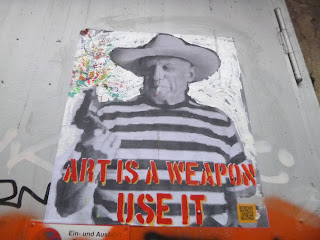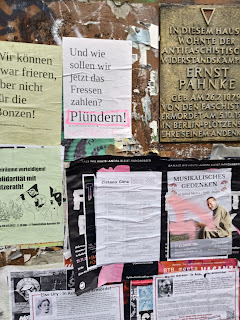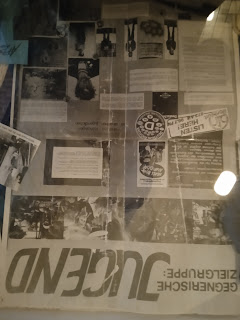Kit Kat, the Döner and a Week in Berlin, Six Months Away
Tomorrow marks six months of my sabbatical year in Berlin, living with the family, meeting Berliners, taking classes at the Freie Universität, conducting interviews, going to art openings, exploring clubland and running around as much as possible.
As a full professor, it is strange to be in a master’s program in European Sociology. Any good therapist knows, from time to time, it is instructive to find yourself on the other side of the couch. Taking four classes for the last three months with students from Kosovo to Istanbul, Kiev to the UK, I certainly have been on the student side of the learning. There have been times when the trains have stopped, and also when professors forgot what they assigned for readings, or failed to give comments on homework. At times students must make it work for themselves and their own lives. Just like at City Tech, students here are entrusted with the chance to learn on their own terms. They all help each other out, learning from the classroom to city, to their own lives, and back again.
At the City University of New York, we had free tuition until a generation ago. Today, the cost for New York State residents is $6,930 per year, for out of state residents, $18,600 per year, depending on the program. In contrast, students at the Free University take classes for almost no cost. “Except for some graduate or postgraduate programs, the Freie Universität Berlin does not charge tuition fees; students are merely responsible for paying certain fees each semester.” I paid some 300 Euros and that was for my year-long subway pass. The school even wrote me to tell me that I had overpaid for everything. In other words, a free university is possible for everyone.
It's really up to the students to do the readings and come to the lectures.
Learning takes place in countless forms, from being at a truly free school, studying American sociologists in Germany, and German and French sociologists I first studied in the US, looking at our country, environmental and foreign policy from the point of view of a once divided city. The walls that remain in our heads and hearts long after they fall.
My research on friendship has taken me from New York to Poland, Berlin to Durban, and countless conflict-ridden areas in between. I’ve spoken with refugees from Ukraine and Apartheid Activists from South Africa, talking with social workers in Durban, South Africa and philosophy faculty in Prague. Perhaps the most important site for my learning has been the mensa, where my fellow students and I eat after class on Tuesdays, chatting about our assignments, conflict, and the world.
Each day, we learn from each other, discussing the contested spaces between Istanbul and Berlin, trees and public spaces under attack, and what we find here, exploring topics including, integration vs nationalism, demographic booms and busts, the politics of data, cleavage points in the European Economic Community, energy and environmental policy, what will happen now that Germany is sending tanks to the Ukraine, and questions about what real democracy could mean. So much to learn just talking with people,trying to understand the world and what it means to people from different places.
Last Saturday, for example, I took the train with a group of students all the way to Kreuzberg, to Cafe Kotti after a six-hour social movement seminar talking about Oranienplatz and refugees, Angela Davis, who spoke there, resistance to fascism, violence and protests, motivation in movements, on and on. A student from Georgia told me about the Stalin riots there in 1959, and how much he loved Faulkner and Borges, looking at the writing magic realist writings about Faulkner’s secret county of Yoknapatawpha, inspired him; another from Norway told me about her mom taking part in teachers strikes, and the ways she found inspiration shifting from material needs to questions about solidarity. (They have no Taylor laws prohibiting striking among public sector workers).
A cycling advocate came to speak with us about vision zero here in Berlin, compared with NYC, where, “New Analysis” from Transportation Alternatives, “Shows Traffic Fatalities Remained Above Pre-Pandemic Levels in 2022 With Record Number of Children Killed Sixteen children under 18 were killed in 2022, more than any other year under Vision Zero. Traffic crashes killed 255 people in 2022 — a 24% increase over 2018, the safest year under Vision Zero.”
Everyone has a theory about why the US is having so many difficulties. Anomie, alienation, an outdated constitution, with a twisted interpretation of the second amendment, skipping the qualifiers "well regulated"... lots to unpack every day here.
“I don’t have that feeling of a panic attack about guns and violence that I have in the US,”I told a professor from the Freie Universitat I was chatting with at Kit Kat club last night.
“You may not be having it, but a lot of others are here, people worrying about rent and the Ukraine and refugees here,” he told me, before we all went back to the dance floor.
“The real struggle for the soul of Berlin is between reason and madness,” said Sean at Watt, sharing a pint.
Still, I think of the world, taking the tram across the city, biking, daydreaming, comparing this world and that, this city and that.
We all have our secret places. Faulkner wrote about his, creating his own mythology.
So much to learn just talking with people, learning to understand the world and what it means to people from different places.
I love my train ride to and from my sociology classes, 55 minutes or so each way, from the former East Berlin, to the West, to classes in a building named for American Henry Ford. There is so much to consider in the global classroom, contending with our hopes and dreams, losses and wounds, possibilities and histories, extending from Brooklyn to Berlin and back.
Each week, a different adventure.
Last week, the Tiger Lillies re-enacted the Karl Kraus novel Last Days of Mankind, where I’m reminded that some people have been having that panic attack for a very long time.
The entire play would take 24 hours to perform and was said by its author to be impossible to stage.
“The world is a prison in which solitary confinement is preferable,” said Karl Kraus.
What a show. Mixing Brecht, opera and rock and roll to tell the story of a death cult, we still seem to be enveloped in.
David, Will and a trip through the treasures, scenes of last judgements, god's, heroes, screams, hope, and anguish at the Bode Museum.
And then off dancing at Berghain for the afternoon.
Back home to read and dream and wonder about it all with the teenager, who is reading Their Eyes Are Watching God and The Heart is a Lonely Hunter, sharing lines they love, watching Moulder and Skully realizing the truth is out there on the X Files.
And biking through the rain,
Found myself biking by the Kino Intimes, in Frederichstein, following the trail of flyers, murals, posters, signs, symbols of resistance movements dating back to the days when youth subcultures helped change the world in 1989. Stopped inside a church that said come on in, were open, finding a museum dedicated to these movements dating back decades.
All for following the trail wherever it took me.
The struggle is everywhere.
All week, I found myself thinking about the legacies of apartheid in South Africa, as well as our failed effort to save the East River Park in NYC, or green spaces across the USA.
Writing, news came my way from Rising Tide North America - Rising Tide North America.
Subject: In Solidarity with Atlanta's Forest Defenders
Date: Jan 23, 2023 8:21 AM
“The news has spread around the country and around the world. On the morning of January 18, police began an attack on the Weelaunee Forest in south Atlanta. In this assault, they shot and killed a forest defender known by friends in the movement as Tortuguita. Tortuguita, remembered by many as "fierce and loving," was a Black and Indigenous anarchist. Their life was spent seeking a world without prisons and without police where people could care for each other and be in relationship with the natural world. This moving remembrance shares just a small part of their spirit and their story. The Atlanta Police Foundation wants to clear hundreds of acres of forest to build a massive training facility that would include a mock city and be a site for police forces from across the country to come train in urban warfare. Tortuguita was part of the movement to protect the Atlanta forest and stop this project. The movement is centered in Atlanta and includes community groups, forest defenders, lawyers, activists fighting gentrification, racism, and police brutality, and neighbors of the forest. But the movement is not only in Atlanta. Everywhere that police oppress indigenous people to protect pipelines, everywhere that forests are cleared, everywhere that profit and control are valued more than life, this movement resonates. The struggle in Atlanta is all of our struggle… Our hearts are filled with love, sorrow, and rage in solidarity with all those grieving their death.”
On and on and on, struggling, living.
Fun afternoon at the spa, the naked co ed spa. Old people, hot young people, everything dropping, drooping, awesome ... Still a spa, hot and cold water, showers, all of us together.
Caroline is one of those I met at an action in New York. Mon amore... 23 years together and going strong.
Skipping off to the Lang Bar, full of old movie posters, two martinis down at the fritz lang bar Stop the mayor, we said, on and on.
On our way to the Eggelston opening here. Strange watching Berliners unpack the landscape of my childhood in the south. Admittedly mine was not all in the magic hour. There were many other elements of light in the material conditions, the unequal lived experiences.
The line to get into the CO Berlin Eggelston show stretched around the block, djs, music, great art, lots of people, friends.
Feeling good and then news from the USA, from Memphis.
It's like Rodney King all over again. Black cops too. Just murdered him, as he's begging for mercy. Blow after blow. America. You have to change. Will you, I'm not sure.
Since past is prologue and we are doomed to repeat the sorrows and the joys of our lives over and over again, it's worth saying again, “fuck the police.” NWA said it in Straight Outta Compton over three decades ago They were right then. And they are right now. The horrors of the USA trickled through my mind all weekend, out meeting new friends in Kotti Cafe, going to sameheads Saturday, dancing all night, waking up, downing a cup of coffee, going to Berghain Sunday, biking over, butterflies before the show, finally in past the sneering door guys, walking in the contact high, bodies in black fetish outfits or SF tea dance, shorts no shirt, body suits, leotards, masks, bathing suits, gender fuck, one man from Italy, is shaking it upstairs in the lighter, more pop orientated set at the Berghain Panorama Bar, showing off his moves, welcoming his fans, dancing all day, having fun even if the door guys kept my friends from coming in, meeting new friends, such as Marco, who was dancing, who shares a shot with me, telling me about his best and worst Berghain moments, inviting me to his party next week, regretting getting losts in the K hole in the more ominous second floor, where the techno, thumps in between strobe lights, and the back room invites, into the darkness, and the bathroom lines into the stalls take forever, women are peeing in the stalls, some just need to pee, meeting a funny couple from tokyo who suggest i just wear a bow tie next week, chatting with another of my yoga teachers at the club, shaking their chakras, some characters from Columbia and Poland, half dressed sharing a bump of special k and MDMA. “Want some,” they ask. Nah. Fear of fentanyl runs deep. Someone is locking up the doors in the second floor bathroom. Marco is worried it's becoming expensive. I’m sad my friends couldn’t come to the club. Why the power trip? The door guys are famous, turning away Elon Musk. I’m always terrified walking up, waiting. They look me over and look away, and wave me in. Four hours later, dancing in the afternoon lights, in the darkness, back to the light, light songs, beats pumping, with everyone. Meeting Frederico afterwards...Talking about Gayle Rubin and the Catacolms for post dancing food at an old Berlin institution....Clärchens Ballroom, where I took this shot on the way out.
Morning sociology class on Monday, unpacking Bordieu on reproduction, capital, and control, revealing the unknown within those things we see every day.
““Taste is first and foremost distaste, disgust and visceral intolerance of the taste of others.”
Gorgeous moody rainy day. Stumbled into a cemetery in Neukölln after a long morning of sociology. After a morning of sociology reading and lectures, I find myself walking through the city, past cemeteries in Neukölln, graffiti in Kreuzberg, looking at posters for events I might find my way to in Friedrichshain. Over the Spree I walk,drizzle giving way to sunshine on a quiet monday. RIP Olie says the graffiti. Hallo say the guys sitting on the bridge, another sleeping. Others are making their way back to work. I’m going back home to write.
And back to chill, read a bit, and make it to Electronic Monday at the KitKat Club on Monday.
The disco is popping with people, half dressed, some more comfortable with it, than others. One man complains about the no shirt policy.
Everyday I think about this city, its people coming, rebuilding it, reshaping this city, ever contending with difference, inclusion, exclusion. We find ourselves chatting about Europe and Germany.
Korteweg and Triadafilopoulos (2014, 664) note: “in Germany, which never had an official multicultural policy orientation, local initiatives aimed at improving immigrant women’s access to language training programmes and combating forced marriage suggest that multicultural principles are influential in Germany’s increasingly diverse urban centers. Moreover, while the Christian Democratic Union / Social Democratic Party … nevertheless pursued consultations with representatives of Muslim faith communities through a recurring ‘Islam Conference’. Drawing on these examples, we maintain that multiculturalism has enjoyed a renaissance of sorts.”
We live in a world with many cultures. We live in a global, interconnected world, where ideas in one city, influence others. Bodies travel, bring new ideas, mixed with the old, ever transforming culture, mixing it like gumbo.
Increase / reduce. Celebrate diversity. We are told it over and over again. That is all fine and good until we encounter differences, someone who is truly different from us, someone who thinks in different ways. Worlds collide. Clashes follow.
Joppke, C. (2014, p. 286) says as much.
So what do we do about difference? How do we talk about it? How do we engage it? That seems to be the driving dynamic of multiculturalism. Learn from different cultures, instead of asking for cultural erasure, amnesia and forgetting. Expand ideas about what democratic living could mean in the face of difference. Incorporate larger perspectives, which allow cultures to co-exist, to intermingle, in betwixt and between.
The real work is integrating takes countless forms, argue Korteweg and Triadafilopoulos (2014). Yet, the clashes are part of process, as Joppke (2014) points out. How to learn from these clashes. How do we take the conflicts which are part of any conversation and allow them to inform our thinking about what democratic living could mean? In a Hegelian schema, contradictions are seen as part of thinking, with inevitable splits and shifts, with old categories of thought evolving into new categories, new bodies of thought.
Here in Berlin, people are always coming here, helping the city renew itself, with new foods, ideas and cultures, that meander around the world. “Some of the new people help keep Berlin from becoming boring or conservative even when some people here might be,” said a young women with a tattoo on her face later in the night at Kit Kat Club. After going out dancing a group of us went for the most Berlin meal you could argue we could have, the Döner Kabab and fries. Today, the döner has become a part of Berlin identity, as well as a part of a global village, synonymous with multiculturalism and techno music. Döner Kababs can be found all over New York City, from MacDougal in the West Village to Albee Square in downtown Brooklyn in a global food court along with Thai food, pho, hot pots from Vietnam, burritos from Los Angeles, etc. “A taste of berlin without the flight,” says the Kotti Berliner Döner Kebab Brooklyn in its advertising. Originally conceived by a guest worker, Kadir Nurman, who’d moved to Berlin from Istanbol. He sold them outside the Bahnhof Zoo. Today, they are the most popular fast food in Berlin (Cichanowicz, 2017), similar to the taco or the pizza slice, two foods synonymous with late night food. Those that eat together stay together. If the story of the döner suggests anything, it is that good food heals and creates community.
And the lessons found at techno clubs are many, as are the possibilities.
Six months in Berlin, the lessons are many.











































































































































































































































No comments:
Post a Comment